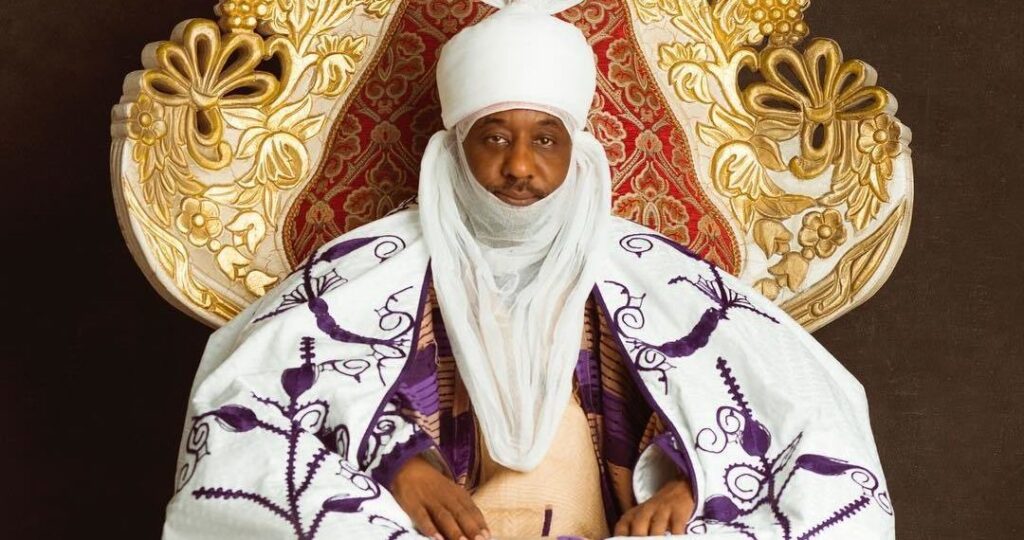By Mistura Adeyemi
Early Life and Education
His Highness Muhammad Sanusi II became the 14th Fulani Emir of Kano on June 8, 2014. Born on July 31, 1961, to Muhammad Aminu Sanusi and Saudatu Anduwa Hussain, Sanusi descends from a lineage marked by royal blood and public service. His forebears include numerous imams and judges. His father, the Chiroma of Kano, was a pioneer career diplomat in Nigeria, setting up Nigerian intelligence services in 1961 and serving as the Nigerian High Commissioner to Canada, Ambassador to Belgium, and the first Ambassador to the People’s Republic of China. He retired in 1979 as the Permanent Secretary of the Federal Ministry of External Affairs.
Academic and Professional Journey
After completing his Qur’anic studies and elementary education, Sanusi attended King’s College, Lagos. He then earned a bachelor’s and master’s degree in economics from Ahmadu Bello University, Zaria, where he also taught economics. In 1985, he launched a distinguished banking career at ICON Ltd. Merchant Bankers. He later joined the United Bank for Africa, where he managed the credit and risk management division, eventually becoming general manager. In 2005, he moved to First Bank, becoming group managing director in 2009.
Alongside his banking career, Sanusi pursued scholarship in Islamic history, thought, and law. He earned a degree in Islamic studies and fiqh from the Africa International University in Khartoum, Sudan, in 1997.
Leadership at the Central Bank of Nigeria
In June 2009, Nigerian President Umaru Musa Yar’adua appointed Sanusi as governor of the Central Bank of Nigeria (CBN). During the global financial crisis, Sanusi mobilized NGN 400 billion ($2.1 billion) to bail out key establishments while insisting on repercussions for those responsible. This approach led to several managing directors being sacked, and sixteen faced criminal charges, with one receiving a jail term. In recognition, The Banker Magazine named Sanusi the World’s Best Central Bank Governor of the Year for 2011.
Advocacy for Girl-Child Education and Women Empowerment
Sanusi has been a lifelong advocate for girl-child education and women empowerment. Speaking at a three-day education summit during the UN General Assembly in New York, he highlighted his commitment to quality education and gender equality. As CBN governor, he pushed for gender representation in the boards and management of banks and advocated for laws addressing women’s rights as the Emir of Kano.
Sanusi emphasized that educating the girl-child addresses many socio-economic issues and contributes to breaking the cycle of illiteracy and poverty. He also highlighted the global deficit of 69 million teachers, particularly in under-served regions of Sub-Saharan Africa, Southern Africa, and Southern Asia.
The Muhammad Sanusi II SDGs Challenge
In 2020, Sanusi launched the Muhammad Sanusi II Sustainable Development Goals (HHMSII SDGs) Challenge to support teachers and catalyze grassroots innovation in education. The project aims to foster teachers’ potential to drive educational transformation, particularly focusing on quality education (SDG 4) and gender equality (SDG 5).
The initiative began with 10 project leaders in its first cohort, each receiving an initial grant of $500 and follow-up funding of $10,000. The second cohort saw over 1,700 applications, with 25 innovative projects selected across eight African countries. The projects, with a focus on girls, received an initial grant of $2,000 each, with potential follow-up funding of $10,000 at the acceleration stage.
Sanusi believes that empowering teachers is critical to addressing all SDGs, as each teacher directly impacts thousands of students throughout their career.

